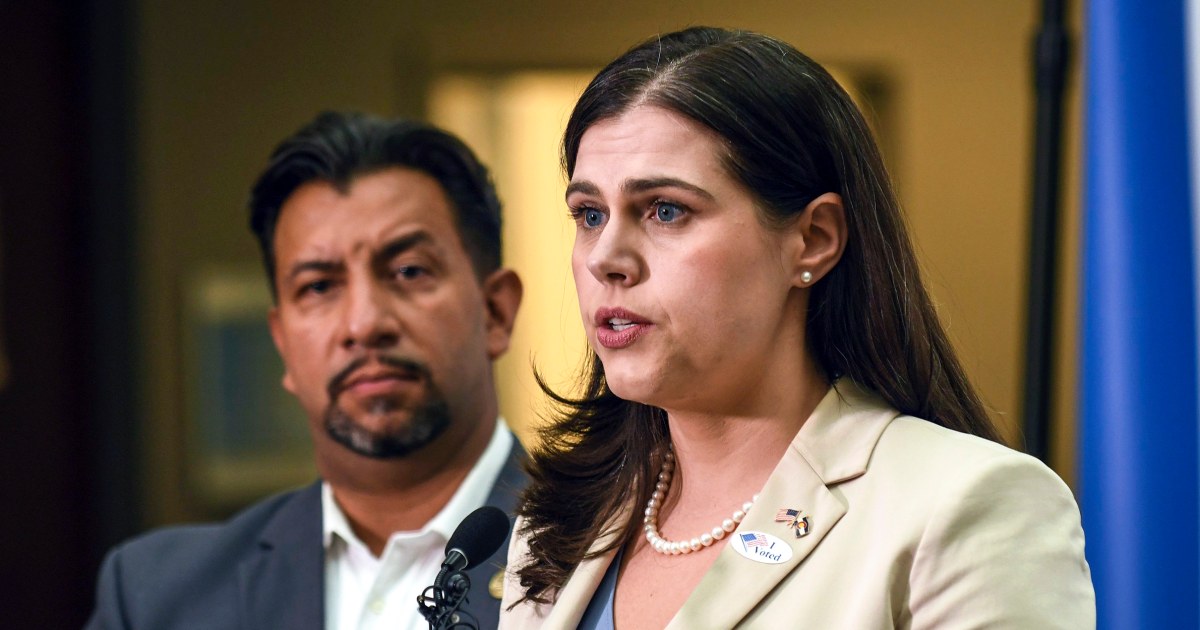Why Colorado’s Democratic secretary of state won’t stop warning about ‘insider threats’

DENVER — Colorado Secretary of State Jena Griswold was in a constant state of motion Tuesday night as she awaited the primary election results that would determine her opponent in her re-election contest this fall.
Moving through her downtown office building, Griswold, who ran unopposed for the Democratic Party’s renomination, checked in with her Rapid Response Election Security Cyber Unit, the group she created in 2020 to help fight election misinformation. She chatted up her cybersecurity squad, composed of members of her information technology team and computer scientists temporarily deployed by the Army and Air National Guards. And she watched the results from the Republican secretary of state primary come in fast — a benefit of the state’s vote-by-mail system in which previously processed votes are tabulated immediately after polls in the state close.
Would her November opponent be Tina Peters, a local election official indicted on charges that she directed a breach of voting machines — exactly the type of “insider threat” to election security Griswold has spent the last several years warning about and trying to guard against?
Within an hour of polls closing, former Jefferson County clerk Pam Anderson had been projected the winner, instead. Peters, almost immediately and without evidence, claimed fraud was responsible for her third-place finish.
Griswold later told NBC News, following Peters’ claims, that the state’s elections are “safe and secure and have bipartisan oversight throughout” the process.
“Peters’ continued spread of election lies is no surprise,” she said, adding that “candidates should respect and accept the results of the free and fair election.”
But those types kind of spurious claims have been at the center of Griswold’s work for the past four years. In an interview Tuesday, she said the Jan. 6 committee hearings as well as a situation in New Mexico last month, where Republican officials refused to certify an election, underscore the need to take “insider threats” to elections seriously as a natural outgrowth of unfounded conspiracy and misinformation.
“The very actions they are describing in the January 6 hearings that led to a failed stealing of the presidency have continued. The January 6 coup has not stopped,” she said. “Attempts to sabotage American democracy have not stopped.”
Colorado’s voting system
Experts regularly credit Colorado with one of the safest and most reliable voting models in the nation.
Its automatic voter registration and universal vote-by-mail systems include myriad safeguards, such as repeated ballot signature verification processes and risk-limiting audits.
Griswold, in her four years in office, has fought for legislation that’s now law. It gives her office the power to certify elections if local officials refuse to do so; subject local officials to penalties for wrongdoing; strengthen existing laws against voter intimidation; and protect election workers in the state.
Colorado, nevertheless, remains at the forefront of misinformation and sabotage efforts by election deniers and other bad actors. The state has forwarded more than 500 threats against election workers to the federal Election Threats Task Force since it was convened last July by the Justice Department in response to the Jan. 6 attack on the Capitol. Griswold has had to confront numerous other “insider threats” against election security from officials within the state’s own government, in addition to the Peters situation. On top of that, Griswold says she herself has received hundreds of violent threats, including death threats, and has been under the protection of both government-provided and private security for months.
That has prompted officials like Griswold, as well as county clerks and other paid government election officials across the state, to apply unique and at times unprecedented measures.
Griswold in 2020 assembled her cybersecurity team so her office could monitor, and alert officials and voters to election misinformation — one of the first efforts of its kind at the time. She has urged election officials across the state to enact physical safety measures for their workers, to include active shooter drills and the installation of bulletproof glass.
It also may not be enough in the current political climate.
“I’m not sure there’s a silver bullet that will convince everybody of election legitimacy. Part of that is because the incentives around the ‘Big Lie’ are so significant in some respects, that it becomes too hard, so to say, to find your way out of it,” said David Levine, an elections expert at the nonpartisan Alliance for Securing Democracy, referring to false claims perpetuated by Donald Trump and his allies that the 2020 election was stolen from him and that elections across the U.S. are rife with fraud.
“But there can be a restoration of sorts as it pertains to faith in our elections,” Levine added, saying such outcomes could come as a result of investment in systems, processes and people, as well as “robust” voter education initiatives — items he noted that were integral parts of Colorado’s model.
Griswold, who serves as the the chair of the Democratic Association of Secretaries of State, said the fact that Colorado’s system does so much to bolster security and trust further demonstrates how little merit many of the claims perpetuated by election deniers have in the first place. Nonetheless, “the threats are destabilizing, the misinformation is destabilizing.
“You get election workers scared and quitting. You get insider threats, people becoming radicalized and becoming security breaches themselves,” she said.
At least 73 Republican candidates who falsely claim that Trump won the 2020 election are still running in secretary of state, attorney general and governor races — offices that oversee, administer, defend and certify elections and election results — in contests across the U.S., according to a nonpartisan group that tracks the races.
The legislation passed in response by the state Legislature, which is controlled by Democrats, not only aims to address so-called insider threats but would also help to prevent the kind of scenario that unfolded last month in Otero County, New Mexico. There, a GOP county commission refused to certify primary election results, citing concerns with voting machines based on false information. The commissioners protested the use of equipment from Dominion Voting Systems, perpetuating conspiracy theories that came out of the 2020 election, even though there was no evidence of any problems with the voting process in last month’s election. (The officials voted to certify primary election results days later, in compliance with a state Supreme Court order.)
It’s the kind of crisis that started with rumblings and rhetoric but metastasized quickly, with the help of lies from Trump allies, according to Maggie Toulouse Oliver, New Mexico’s Democratic secretary of state. Like Griswold, she’s is up for re-election this fall, and has also faced growing threats amid her own efforts to keep elections safe, secure and free from interference.
“Normally, you see rumors like this burble up and die out pretty quickly, but this has all become a totally new beast,” Toulouse Oliver said.
On primary night in Colorado, all was safe and secure.
A reporter looked on at a vote center in Jefferson County as trained election judges — assembled in bipartisan groups — carefully oversaw machine-run processes to open and count ballots, and verify ballot signatures. When issues infrequently arose — these could include signatures that didn’t match with the ones on record, a coffee stain on a ballot or a voter having returned primary ballots for elections in both major parties — these trained judges stepped in to resolve them, with the chain of custody of each document meticulously documented. Surveillance video of ballot drop boxes near and far was scrupulously monitored.
The day went smoothly — not an unusual outcome for a low-turnout primary election. An election judge getting Covid and a water outage in the building of the Elections Division were among the only hitches.
But, Griswold noted, this wouldn’t prevent some people from trying to claim fraud.
“Nothing that we say or do will stop the far-MAGA-right from pushing out these conspiracies. It is a political tool to get power, period,” she said.


